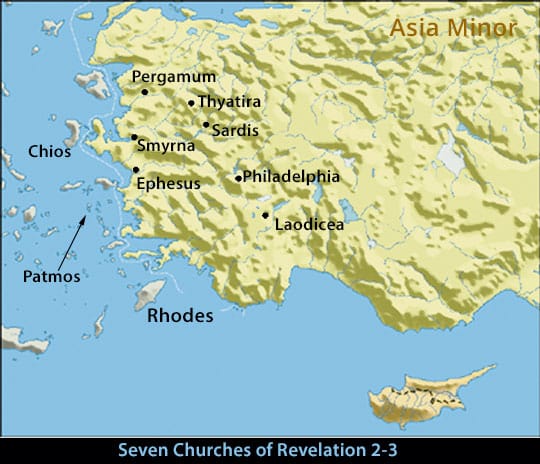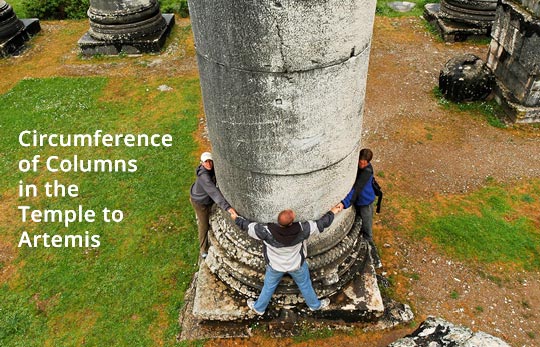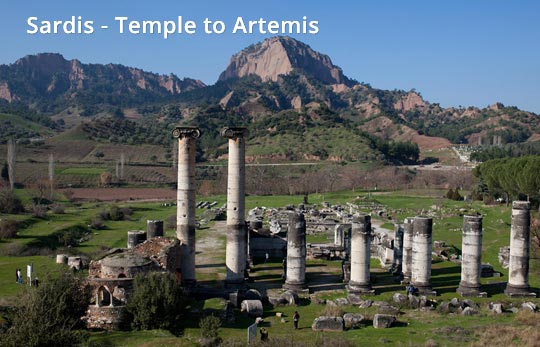
The messages to the seven churches in Revelation 2-3 have been challenging. The messages have been dark and serious at times. So far, Jesus has started each message with a positive greeting and ended each one with a promise of blessing. There have been times that I would have liked to have made the messages more positive, but I do not want to be rebuked, as God rebuked the priests in Malachi 2 for changing the message of Scripture. In Isaiah 30:10 God rebuked the people who wanted the prophets to prophesy pleasant words. This helps me understand that my responsibility is to teach what God has said so that you know what He has said. That has been my commitment to Him and to you.
Steps to a Dead Church
To date, we have learned that the church at Ephesus had lost its first-love. They no longer loved God with all their heart, all their soul, with all their mind and with all their might. The message to the church in Smyrna was difficult to identify with because it was a persecuted church and we are not at this time persecuted to the extent as they were. That church has been the outstanding church among the four that we have studied so far. The spiritual condition of the church in Pergamum was worse than that of the church in Ephesus because some in the church held to false doctrine. As a result they worshiped idols and were engaged in sexual sins. The spiritual condition of the church in Thyatira was even worse because the pastor and leaders tolerated a false teacher called Jezebel. Consequently, Jezebel had followers who worshiped idols and engaged in sexual sins.
The picture that Christ has painted for us so far is that when a high view of the authority of Scripture is lost and the accurate teaching of the Word of God disappears, then spiritual decline has begun. Also, we must remember it is the Word of God that teaches us how to love. So as a result, love was missing too!
Our study today is in Revelation 3:1-6 and it is about the church in the city of Sardis. We will discover that the next step in the spiritual decline of a church is the death of a church! Sadly, most of the people in the church in Sardis thought their church was alive; so Jesus informed them that their church was dead. That must have been a great shock. Would it not have been for you had you been in that church?
As I have studied each church, I have been asking myself if I am guilty of the very sins that existed in those churches. I pray that each of you have been evaluating yourselves too as we have been studying each church. Remember that these churches were not theoretical or abstract illustrations. Each one was made up of real people, in a real church, in a real city.
The Problem
Revelation 3:1-6 is our study and it can be outlined as The Problem (v. 1), The Warning (v. 2-3), and The Great News (c. 4-6). This message is very different from the others because this one does not start on a positive note. It immediately starts with a statement describing the true condition of the church. I think this is instructive for pastors, teachers and everyone else. I believe we can blunt the impact of Jesus’ message here and elsewhere in Scripture if we try to turn our Lord’s warnings into positive statements. People do not like negative statements, but Jesus was negative when He needed to be. We need to echo Him whether He is positive or negative. The prophets in the Old Testament, Jesus in the gospels, and the apostles in the New Testament did not always give a positive message. In Galatians 3, Paul warned those in the church in Galatia when he asked, “Who has bewitched you?” In 1 and 2 Corinthians the apostle rebuked the believers in Corinth repeatedly for their sins. Then in Philippians 4:2, the apostle Paul publicly named two women and urged them to live in harmony. Those are several negative examples. You can then understand that it is not my responsibility to try to make Scripture always sound pleasant to our senses.
We find in verse 1 that Jesus bluntly describes the church’s problem. The apostle John writes,
To the angel of the church in Sardis write: “He who has the seven Spirits of God and the seven stars, says this: ‘I know your deeds, that you have a name that you are alive, but you are dead.’” Revelation 3:1 (NASB)
As we have learned before, the word “angel” refers to the pastor of the church. These messages were also sent to the congregations in the seven churches according to Revelation 1:11. This means the messages were not just personal messages for the pastor to read and then discard. They were written to the pastor but intended for all to hear.

Historical Background of the City
Next we are told this message was sent to the church in Sardis. History tells us that the city of Sardis was about thirty miles southeast of Thyatira and about fifty miles northeast of Smyrna. Sardis was on a major commercial trade route and also on an important military road. The acropolis of Sardis was large and lay on a ridge of the Tmolus mountain range, forming a natural fortress which was extremely difficult for an invading army to penetrate. Today, there are very few ruins left. One of the outstanding ruins is that of the temple of the goddess Artemis. It lay in the Hermus Valley about 800 feet below the Acropolis. The columns of the temple were so large that four men, holding each other’s hands, are needed to surround the entire columns. That helps us understand the size of the temple. The gymnasium in the ancient city was enormous.
Herodotus, the 5th century B.C. historian, tells us sarcastically that Sardis was a city of “tender-footed” people who could only play on the cithara, strike the guitar, and sell by retail.[1] William Barclay adds that Sardis was a city of peace, where a “man whose dreams are dead and whose mind is asleep, the peace of lethargy and evasion.”[2] In short the people in the city were given to pleasure and leisure. So once again, I have talked about the history of another city to make the point that Jesus sent messages to real people, in real churches in real cities.
Seven Spirits of God and the Seven Stars
Then Jesus said that He has “The seven Spirits of God and the seven stars.” The phrase “seven spirits” would remind the readers of Isaiah 11:2 or Zechariah 4:1-10. In either case, the symbolism in both passages refers to the Holy Spirit. We have already learned the seven stars refer to the pastors and or the other leaders of the churches. So, Jesus is directing the Holy Spirit and the pastors of the churches.
Name You Are Alive, But You Are Dead
Then Jesus gave the church His verdict about them. He said, “You have a reputation that you are alive, but you are dead.” Jesus said those outside the church thought the church was alive. Jesus gave them unexpected news! They were dead! This is going to be a valuable lesson for us! How did this occur? Why is this news to the church? Jesus would not have said it if they had been working to correct the problem. Spiritual decline is very subtle.
The spiritual decline of a church is gradual like the condition of a frog in a pan of water that is gradually heated. As the heat under the pan gradually increases, the frog sitting in the pan is slowly cooked. The spiritual decline of a church works in the same way. Little by little the pastor and the people drift from the Word of God, supposedly for good reasons. The most common reason is the pastor and leaders drift in their relationship with God. Another reason may be that the pastor tries to please the people. The apostle Paul warned Timothy that the people in the church would eventually not “endure sound doctrine,” and would want their ears tickled. Paul’s point was that when the pastor tries to please people, the pulpit becomes less committed to teaching Scripture, and becomes more concerned about preaching styles and dynamics that motivate people, rather than in a commitment to the truth and dependence upon the power of the Holy Spirit.
Now let us pause for a minute and ask a question. What did Jesus mean when He said this church was dead? Some of us may be thinking that this was a church with only a few people left. With God’s help, years ago I helped a pastor start a new church near the Los Angeles International Airport. Initially, the church was about forty people. After a few years that church was exceeding the seating capacity of the building they were renting. So they started looking for another place to meet. They found a very large church building that could seat about 700-800 people on Sunday morning. They learned that only thirteen people were attending that church’s worship service on Sunday morning. The new church asked if they could rent the building Sunday afternoons, but the older church insisted that they be allowed to have seats on the board of the new church as a condition for renting the big church building. That was a surprise and it revealed a serious problem with the older church. That older church had died long ago. That is the same problem in Sardis. It had been dead for a while too. Jesus said that He knew. But others thought this church was very much alive because too often our measurement for spiritual health is numbers. Jesus’ comment suggests the numbers in Sardis were probably still good.

The Warning
Verses 2-3 explain why Jesus called this church dead.
Wake up, and strengthen the things that remain, which were about to die; for I have not found your deeds completed in the sight of My God. So remember what you have received and heard; and keep it, and repent. Therefore, if you do not wake up, I will come like a thief, and you will not know at what hour I will come to you. Revelation 3:2-3 (NASB)
Notice that Jesus said “wake up” two times in these verses. He said “wake up” at the beginning of verse 2. Then He encouraged them to do four things. Next He closed with the call to “wake up.” Let us examine the four encouragements that Jesus gave them.
First Encouragement — Strengthen the Things That Remain
The first encouragement that Jesus warned them to do is “strengthen the things that remain, which were about to die; for I have not found your deeds completed in the sight of My God.” The Greek word for “strengthen” is sterizo, from which we get the word steroid. The word means to make things stronger. Jesus calls them to strengthen the things that remain. But what were the things that remained that were about to die? Jesus explained the things were their deeds and He said they were not completed. Usually, we think that deeds refer to a task such as teaching the children in Sunday School, working the sound booth, singing, ushering, playing an instrument, or helping someone in some way, for example. Now Jesus could have been referring to those deeds. Matthew 26:6-10 is a good example of that type of deeds. The passage tells us about a woman who did a good deed when she poured costly perfume on Jesus’ head. Other examples are found in Luke 24:19; John 7:21; 1 Corinthians 15:1-2; and Titus 3:14. These are examples of our most common definition.
But there is a second definition of deeds in Scripture. We call them sins. Galatians 5:19-21 is a good example of this second definition of the word deeds. As I read it, notice the word deeds occurs at the beginning and then a list of sins are given.
Now the deeds of the flesh are evident, which are: immorality, impurity, sensuality, idolatry, sorcery, enmities, strife, jealousy, outbursts of anger, disputes, dissensions, factions, envying, drunkenness, carousing, and things like these . . . Galatians 5:19-21 (NASB)
Another example of the second definition is found in 3 John 10 where deeds refers to wicked words.
For this reason, if I come, I will call attention to his deeds which he does, unjustly accusing us with wicked words . . . 3 John 10 (NASB)
Therefore, when Jesus said, “strengthen the things that remain” I believe the things or deeds that He was referring is both type of deeds. So, “wake up” could include continue doing good tasks and godly behavior, whatever they were, and repenting and forsaking evil deeds.
Second Encouragement — Remember What You Received and Heard
Verse 3 gives us the second encouragement. They were to ”remember what they had received and heard.” This refers to remembering what they were taught by the apostles. Since the apostles called the Old Testament Scripture, taught us about Jesus and wrote the New Testament, we are to remember everything that we call Scripture or the Bible. Listen to what the apostle Peter wrote in 2 Peter 1:12-15. Peter said,
Therefore, I will always be ready to remind you of these things, even though you already know them, and have been established in the truth which is present with you. I consider it right, as long as I am in this earthly dwelling, to stir you up by way of reminder, knowing that the laying aside of my earthly dwelling is imminent, as also our Lord Jesus Christ has made clear to me. And I will also be diligent that at any time after my departure you will be able to call these things to mind. 2 Peter 1:12-15 (NASB)
Notice that Peter urged them to remember what they had heard. In Jude 3 we are urged to contend for the faith once for all delivered to us.
Beloved, while I was making every effort to write you about our common salvation, I felt the necessity to write to you appealing that you contend earnestly for the faith which was once for all handed down to the saints. Jude 3 (NASB)
The word contend refers to conflict or a battle. That is, the Word of God must be defended. We must fight to make sure that Scripture is taught accurately; because it is the essential ingredient that the Holy Spirit uses to transform us into the image of Christ and help us know God. The closer we draw to Him, the more we will be changed. In Jude 17 we are told,
But you, beloved, ought to remember the words that were spoken beforehand by the apostles of our Lord Jesus Christ . . . Jude 17 (NASB)
Jesus’ message is that the church in Sardis had drifted away from the faith once for all delivered to the saints—from Scripture! Now remember the declining pattern of three of the previous churches. In Ephesus the church left their first love. In the church in Pergamum, some accepted false teaching and had gone off into error and were committing sexual sins. In Thyatira the church had abandoned Scripture even further by allowing a false teacher to preach error and some people were following her teaching and sinning. But in Sardis, the church had abandoned Scripture completely for all practical purposes. Oh, maybe Scripture was read during the worship services on Sunday or at home. Then the pastor might launch into some story about the Bible or complaint about the culture.
This reminds me of an occasion when I was active in a large church in California. The church had a Bible Institute, and we took a group of those students to the Bay Area in central California. The purpose of the trip was to expose them to a variety of churches. The pattern we followed was that we would visit a church and after the service the students were given an opportunity to have a discussion with the pastor. One day, we visited a church in the city of Berkley. It was a large, elegant church. On Sunday morning, we attended the service. The church service was wonderful. We sang great hymns, heard a missionary give a brief report, the offering was collected, a baptism occurred, and the pastor spoke. The message was encouraging, and nothing sounded wrong. It was a positive experience. After the service, the students met with the pastor. The pastor started by warmly welcoming them to the church, spoke briefly, and then let the students ask questions. Eventually, one of the students asked what the pastor believed about the virgin birth of Christ. After a few comments, the pastor said that the virgin birth was an encouraging story, but it never happened. Jesus was just a man who taught uplifting moral principles. Immediately, you could feel the emotion of the students in the room. Then someone asked what he believed about the creation account in Genesis 1. He said Genesis 1 was a myth. The students kept asking questions, and it became clear that the pastor was a false teacher. This is a good example of a church that appeared to be alive, but was spiritually dead. The pastor used Scripture to leap to some encouraging, biblically sounding topic for his sermons. This is common. Read a verse and then ignore the text. Scripture was not explained.
In the last study titled, “Church That Tolerated False Teachers and Sin,” I made a statement that might have been misunderstood. Therefore, I would like to clarify my point. I said that “Scripture never warns us about songs, choirs, musicians, the design of the pulpit, the charisma of the pastor, or if he is a good speaker.” Now I hope it was clear that I am not opposed to any of those things; nor do I believe they are unimportant. We are commanded to worship God with song (Psalm 96). I tried to make two points in that statement. The first point is that if we search the pages of Scripture we cannot find any warnings about music programs, the preaching style of the pastor or any of the other things I mentioned. My second and the important point, is that Scripture does warn us to avoid false teaching. Now if there is false doctrine in our music or in anything else that we do, that is wrong, but the root problem is still false doctrine. That was the root problem in the church in Ephesus, Pergamum, Thyatira, and Sardis. They had a low view of Scripture and the missing priority was the solid, accurate teaching of Scripture.
So the steps to a dead church are leaving your first love, false teachers, false doctrine, and the abandonment of Scripture.

Third Encouragement — Keep It and Repent
The third encouragement that Jesus gave them was to “keep it, and repent.” Those in the church must keep what they hear. This reminds me when I was attending BIOLA College in Los Angeles, CA. My major was Bible. At that time my BIOLA dorm was next to the Church of the Open Door on Hope Street in downtown Los Angeles. Dr. J. Vernon McGee was the pastor and I attended the church. During one Sunday morning worship service I was sitting near the back of this very large church. I do not remember what Dr. McGee was preaching, but I remember sitting there and crying and trying to keep my crying quiet. Then an older woman turned around during the service and asked if I was okay. It was obvious to her that I was not okay, but she was kind. I replied that I was okay, but I was not. I was crying in misery because I did not want to obey God and keep His commands. I knew I was wrong. Then I realized that my struggle was a heart issue. I realized that I had a choice. I should be wanting to obey Jesus. So, I repented of my sin and asked God to change my heart and help me want to obey Him, and He answered my prayer. I think that is what Jesus was saying here! Jesus called them and He wants them to obey Him, to obey God. When Jesus urged this church to “keep it, and repent,” He revealed that they were not obeying Him and were not repenting. Can I ask, “Do you want to obey Jesus? Do you repent of your sins?”
Fourth Encouragement — I Will Come Like a Thief
The fourth encouragement that Jesus gave them was that they must wake up or face punishment. He said that if they did not respond that He would “come like a thief, and you will not know at what hour I will come to you.” That was a warning of judgment. Notice that Jesus did not say when He was coming. He was giving them time to repent. Jesus urges believers to strengthen their spiritual behaviors, remember Scripture, obey it, and repent of all our sins.

The Great News
Verse 4 gave them some great news.
But you have a few people in Sardis who have not soiled their garments; and they will walk with Me in white, for they are worthy. Revelation 3:4-5 (NASB)
Promise of Eternal Security
When Jesus said this, He played off of a known fact in the culture, that those who had soiled garments could not worship at the pagan temples. William Barclay says,
In the pagan religions it was forbidden to approach the gods in garments that were soiled or stained.[3]
Therefore, Jesus said that He still had a few people in the church who could and were worshiping Him. Verse 5 explains that these were believers.
He who overcomes will thus be clothed in white garments; and I will not erase his name from the book of life, and I will confess his name before My Father and before His angels. Revelation 3:5 (NASB)
The word “overcomers” refers to believers. 1 John 5:5 says that overcomers are those who believe in Christ. This means these few people were the only believers left in this church. We are further told in verse 4 that these few people will walk with Jesus in white and again in verse 5 we are told that they will wear white garments. This is an important statement because white garments in the book of Revelation refer to the holiness of believers (Revelation 4:4; 19:14). So, the few people are the only believers left in this church and one day they would be in heaven in immortal bodies and be completely righteous.
Jesus also promised them eternal security in two ways. First, Jesus said, “I will not erase his name from the book of life.” This is a promise of eternal security for believers. Alan Johnson helps us understand the “book of life” with this comment,
In ancient cities the names of citizens were recorded in a register till their death; then their names were erased or marked out of the book of the living.[4]
Once again Jesus is playing off a custom of Sardis. The citizens in the city were on a list. We call it a directory. When someone died, their name was removed. So, Jesus tells these believers their names would never be removed from His book of the living which is the Book of Life.
The third way Jesus promised them eternal life occurred when Jesus said, “I will confess his name before My Father and before His angels.” This is a reminder of His statement in Matthew 10:32-33 and Luke 12:8 that He will confess the names of believers to the Father. So again, every believer is eternally secure. Jesus’ message was that even though Jesus might discipline the church, the few believers who were left in this dead church were eternally secure. They did not have to worry about their eternal life. So, true believers are promised that they are eternally secure.
Then verse 6 says,
He who has an ear, let him hear what the Spirit says to the churches. Revelation 3:6 (NASB)
Conclusion
Even though Jesus’ message was disappointing to the church and to us, it is recorded for us so that we will evaluate ourselves and our church. The message is a warning and a reminder that Scripture must be read and actually taught in our churches. Every church needs to be committed to a high view of the authority of Scripture, accurately teach what God has said, and then live in obedience to it. Sermons must seek to actually explain what God wants us to know. Our teaching must be “thus saith the Lord.”
I would like to close with this very encouraging note. The early church fathers say that the church in Sardis did respond to Jesus’ warning. We are told that the early Christian apologist Christian Melito was the pastor of the church in Sardis[5] in A.D. 160-177. That means Jesus did not have to destroy the church. Further, we are told that Melito wrote many works defending Scripture, but most of them have perished except a few.[6] He was a very influential man of God. Therefore, we can rejoice. Jesus is building His church and He has given us guidance. The Sardis church was once again committed to a high view of Scripture and a commitment to explain what God has said. The serious study of Scripture, obedience, and repentance is the key to knowing God who has been from the beginning, and as a result to grow spiritually!
References:
1. William Barclay, Letters to the Seven Churches. P. 71. Frank Gaebelein. Expositor’s Bible Commentary. Regency Reference Library. 1984. vol. 12. p. 448.
2. Ibid.
3. William Barclay, Letters to the Seven Churches. P. 77. Frank Gaebelein. Expositor’s Bible Commentary. Regency Reference Library. 1984. vol. 12. p. 449.
4. Alan Johnson. Revelation. Frank Gaebelein. Expositor’s Bible Commentary. Regency Reference Library. 1984. vol. 12. p. 450.
5. Ante-Nicene Fathers. Hendrickson. 1995. vol. 8, p. 750.
6. P. Pratten, “Remains of the Second and Third Centuries: Translator’s Introduction,” in Fathers of the Third and Fourth Centuries: The Twelve Patriarchs, Excerpts and Epistles, the Clementina, Apocrypha, Decretals, Memoirs of Edessa and Syriac Documents, Remains of the First Ages, ed. Alexander Roberts, James Donaldson, and A. Cleveland Coxe, vol. 8, The Ante-Nicene Fathers (Buffalo, NY: Christian Literature Company, 1886), 747.
Suggested Links:
Evaluating the Health of Your ChurchEphesus — Serving God Without Your First Love
Smyrna the Persecuted Church — Be Faithful Until Death
Pergamum — Church That Ignored False Teaching and Sin
Thyatira — Church That Tolerated False Teachers and Sin
Philadelphia — The Faithful Church That Kept Jesus’ Word
Laodicea — The Lukewarm Church Is Neither Hot Nor Cold